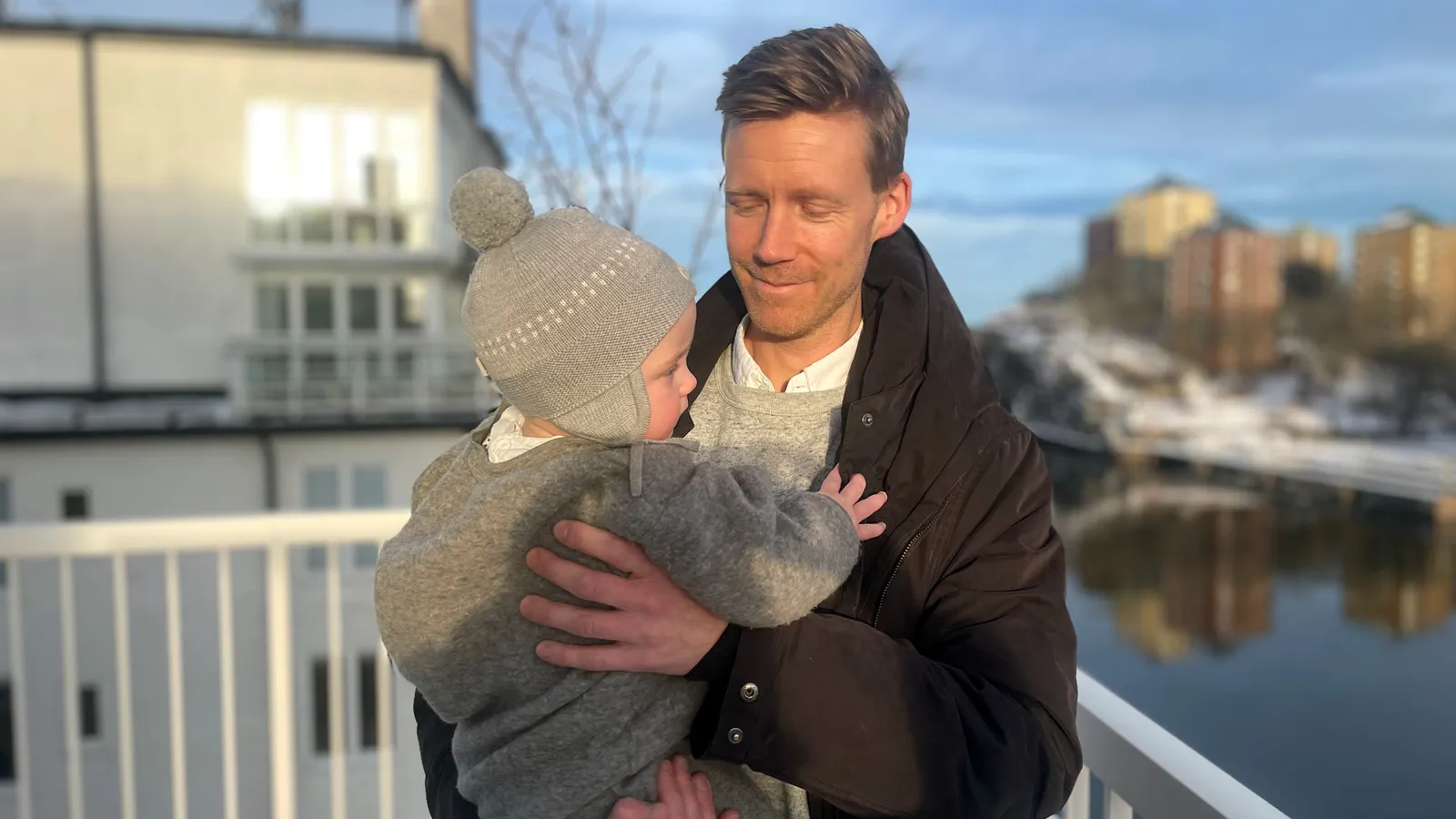Sweden: Where it's taboo for dads to skip parental leave
It's been 50 years since Sweden introduced state-funded parental leave, designed for couples to share. The pioneering policy offers some surprising lessons for other countries.

Kjell Sarnold has a glint in his eye as he describes fond memories of his parental leave in the 1970s. His son was eight months old, and they bonded during a balmy September when his employer granted him four weeks off work on 90% of his salary – paid by the state – while his wife returned to work full-time.
"We went out for a lot of walks. I had one of those baby carriers on my back. We were outside all the time," says Sarnold, who was living in Stockholm's archipelago at the time. The period also involved changing countless nappies, lots of cooking and learning to comfort his son when he was upset. But on the whole, Sarnold loved it.
He doesn't work for a progressive start-up or a global corporation ramping up its employee experience policies. He's now a 74-year-old retired car mechanic, and his memories are from five decades ago, soon after Sweden became the first country in the world to introduce 180 days of state-funded parental leave that wasn't gender-specific. The idea was it could be shared between couples as they saw fit, giving the same rights to fathers and mothers.
Since 1974, when the policy became law, the number of paid parental-leave days has increased even further. Today, parents in Sweden (including LGBTQ+, adoptive and single parents) are legally entitled to a total of 480 days off work, one of the most generous state-funded packages on the planet. For the first 390 days, most parents can claim benefits equivalent to 80% of their salaries, up to a monthly salary cap of SEK47,750 ($4,650, £3,590). After that, there is a daily statutory compensation of SEK180 ($16, £14).
Sweden's approach offers plenty of insights for countries or workplaces that are looking to offer more gender-neutral childcare policies. Plus, there's a growing body of research highlighting the positive consequences of taking leave on parents' wellbeing. At the same time, however, equality campaigners argue that while Sweden's policies might seem utopic to feminist observers, its success in encouraging parents to share leave has stalled in recent years, and the majority of heterosexual couples still don't share their state-subsidised leave days 50/50.
The fight to normalise paternity leave
Sweden's progress in encouraging time off for new fathers must be viewed in the context of its politics. While women's rights movements grew globally in the 1960s and 1970s, its ideologies quickly entered mainstream politics more rapidly in Sweden than in many other countries. Successive Social Democrat prime ministers, most notably Olof Palme, promised to boost gender equality and strengthen the welfare state, using taxes to fund the shift.
"One of the stated goals was to get fathers more involved in care work in the home… and at the same time make it possible for mothers to work more or go back to the workforce sooner," explains Ylva Moberg, a researcher at the Swedish Institute for Social Research, part of Stockholm University.
Despite strong support at the ballot box, social norms didn't shift overnight. In 1974, when the shared parental leave policy was first introduced, just 0.5% of all leave days were taken by fathers; by the 1990s, the proportion was still in single digits. In 1995, 30 days of leave were, for the first time, reserved specifically for each parent, with the idea that having a dedicated "daddy month" would incentivise couples to share the benefit more equally. This "use-it-or-lose-it" leave was increased to 60 days in 2002 and 90 days in 2016. Each of these reforms has seen men taking on a larger share of parental leave days, reaching around 30% today.
A further incentive designed to encourage parents in Sweden to share leave is the flexibility around taking their state-subsidised time off. While many couples take turns doing a stint at home before a child starts pre-school, couples can also take up to 30 parental-leave days simultaneously, and 96 days can be saved to use when a child is older (aged between four and 12). Parents also have the legal right to work part-time hours, and get paid to go on parental leave during the remainder of the working week.
Fathers in Sweden take the highest proportion of state-subsidised leave in the EU, according to recent OECD data. A study published in 2023 by the Swedish Social Insurance Inspectorate found that just 18% of fathers who had children born in 2017 hadn't used any of their parental leave allowance.
Moberg argues that – in professional settings at least – workplace culture has shifted. "There is now a little bit of stigma on men who don't take leave," she says. "It's so kind of ingrained now that being a good father, a modern father, is to take at least some leave."
Martin Roxland, deputy CEO and cofounder of Froda, a Stockholm-based fintech start-up, shares this view. Roxland took nine months of parental leave with each of his first two children, while his wife went back to work after taking a similar amount. The 39-year-old is currently at home with his youngest child, 10-month-old Siri, whose latest hobbies include chewing picture books and a fascination with the family's dishwasher. "It's great to get to spend so much time together and actually get to know her before she starts preschool," says Roxland, pictured at top. "I can't really see a reason for not splitting [leave] 50/50."
There is now a little bit of stigma on men who don't take leave. It's so kind of ingrained now that being a good father, a modern father, is to take at least some leave – Ylva Moberg
As a manager, he admits Sweden's parental leave policy isn't without its challenges, since colleagues frequently ask to take time off when they have children and their workloads need to be covered. However, since the policy has been part of Swedish life for decades, established businesses have baked-in routines, and start-ups like Froda have to be agile enough to develop their own blueprints, or risk losing talent.
Happier and healthier employees
Shared parental leave has shifted the dynamic at home, and had a significant effect on Swedish workplace culture.
It's typical that parents who've split leave continue to share other childcare responsibilities, such as taking their kids to and from preschools, or staying at home with a sick child. This means that in many offices, there isn't a culture of working late, or a norm of parents paying for private childcare. "Modern companies try to avoid early and late meetings in order to make it easier for parents to pick and drop off their children from preschool," explains Amanda Lundeteg, who runs Allbright, a non-profit organisation working to improve diversity in business.
"In Sweden, you need to have solutions in place for both men and women to have that sort of work-life balance," says Roxland, who has also worked in the UK, The Netherlands, Denmark and South Africa. He argues that Sweden's parent-friendly office culture is likely also influenced by other Swedish norms, such as less hierarchical management structures and high levels of social trust. "It's not about the hours you're at work, but rather the work you actually get done," says Roxland. Plus, Sweden has a tech-savvy population that embraced digitalisation in the 1990s, which helped normalise a degree of flexible working from home long before the pandemic.
Sweden's parental-leave policies have even become an increasingly popular tool for businesses seeking to attract global talent with the lure of a better work-life balance; Swedish companies including Spotify and Volvo recently introduced comparable parental leave systems for their employees worldwide.
"They are using parental leave as an employer-branding strategy… something that many parents really appreciate when they apply for jobs," explains Lundeteg. She adds it's a common pattern for Swedes working abroad to return to their home country to start a family in order to make the most of the benefit.
In 2023, researchers at Stockholm University's Department of Public Health Sciences released a study on the benefits of extended parental leave on mental health. Following a global scientific literature review, they concluded that mothers and fathers in countries with generous leave schemes – including Sweden – had a reduced risk of depression and burnout. Separate research also suggested a drop in risky behaviours including alcohol abuse among fathers in Sweden in connection who took parental leave, and a dip in psychiatric hospitalisations amongst migrant fathers who took more leave.
Sol Juarez, an associate professor in public health sciences. who co-authored the research, says this suggests generous parental leave policies can have "a major impact" across a population at large. "Healthy parents means healthy societies and also healthy workers," she says, supporting the idea that Sweden's "family policies represent an investment" far beyond a welfare hand-out.
Ideals versus reality
However, academics and gender equality campaigners in Sweden are keen to stress that there are limitations to Sweden's approach, which international observers in awe of the Scandinavian country's progress often gloss over.
Moberg points out that while 30% of all available days are taken by fathers, this means the majority are still taken by mothers; while Sweden is more "gender equal" than many places, it isn't a place where childcare is shared 50/50, despite its global reputation for equality.
There is also research that suggests certain groups in Swedish society are much less likely to use their allocated leave days than others, including fathers on lower incomes and those who are unemployed, self-employed or born abroad. "This is very much a question of social class," argues Moberg. "Even if you do get about 80% of your earnings, there is still a loss in earnings, right? So, some families with lower earnings might feel that they can't afford to lose that."
It's great to get to spend so much time together and actually get to know her before she starts preschool. I can't really see a reason for not splitting [leave] 50/50 – Martin Roxland
Eligibility for earnings-related leave in Sweden also depends on having a steady income before becoming a parent (although all parents are granted a base-level statutory benefit from the state), which can make it harder for groups including students, gig economy workers or people with chronic health conditions to take parental leave.
Plus, despite years of policies designed to promote equal opportunities in caregiving and the workplace, Lundeteg says traditional "culture and norms regarding who should be the primary caretaker" are still prevalent in many parts of Swedish society. She points to research suggesting men who work in male-dominated industries are less likely to take parental leave than those working in more female-dominated sectors.
Researchers have also shown Swedish mothers remain more likely to work part-time than men, potentially perpetuating traditional gender roles and inequalities in the home. Swedish mothers also spend more time doing household chores, and take more time off to look after sick children, all of which can result in a slower salary increase, says Lundeteg. "Sweden lives a bit on old merits, I think. We cannot achieve equal workplaces if we do not start sharing equally at home."
In Sweden, the difference between gross average hourly earnings of male and female employees in Sweden is 11.2%, which is below the EU average of 12.7%, but well above the 5% gap now achieved in some European countries including Belgium, Italy and Slovenia. Research by Allbright indicates that the growth of women in executive management roles in listed companies has never been slower. It stalled at 27% in 2022, after a decade of rising by just 1% each year.
However, while organisations like Allbright argue the solution is for greater proportion or parental leave days to be specifically earmarked for each parent, Sweden's current right-wing government advocates increased freedom of choice when it comes to using parental leave.
From July, parents will be able to take up to 60 days of leave simultaneously up until a child turns 15 months old, and families will even have the option to transfer up to 90 days of parental allowance to another adult. The government argues the policy will enable relatives or close friends to help out with childcare, reflecting the complexities of what Swedes call "livspusslet" (the puzzle of life).
However, others fear it could encourage families to "contract-out" childcare, and the policy has been strongly criticised by Sweden's largest opposition party, the Social Democrats, who first instigated Sweden's gender-neutral leave system in the 1970s.
Global lessons
For other countries – or companies – who want to encourage parents of all genders to take more parental leave, Sweden's experiences offer some valuable lessons, says Moberg.
First, she points to the limited parental leave uptake by Swedish fathers before the country introduced "use-it-or-lose-it" quotas. Moberg suggests that similar incentivised reforms will therefore likely be needed to drive radical change elsewhere. "Nothing happens on its own. You will not have more gender equality automatically," she says. "You need to create some kind of strong incentives to make it happen."
Plus, while growing numbers of fathers are now going on parental leave, the fact that Swedish women still tend to take the lion's share demonstrates the limited impact of legislation in the face of centuries-old gender norms.
"Even if you introduce a policy that strongly encourages people to [change], it's quite hard and takes time to change norms and culture," says Moberg. "In Sweden, like most other countries, the mother is seen as the kind of natural primary care giver, and changing the mindset to thinking that both parents have equal responsibility – that's a slow change to happen – and still not everyone is on board."
A source of pride
Putting health, economic and political debates aside, Sweden's long-running, family-friendly parental leave policies clearly remain a source of pride for parents like Roxland, and septuagenarian Sarnold.
"It's a fantastic subsidy that you get from the state," says Roxland. He concludes that it's both a practical tool that helps parents share logistical workloads, and a catalyst for supporting workplace diversity, which he hopes other countries will continue to be inspired by.
Sarnold says he's enjoyed seeing growing numbers of fathers taking leave over the past five decades, and watching Sweden evolve into a more gender-equal society than it was in the 1970s. But more than anything, he celebrates the policy's potential for helping parents to forge deeper bonds with their children. "You get closer to one other. That's what happens," he says. "I would absolutely recommend it."
-bbc






